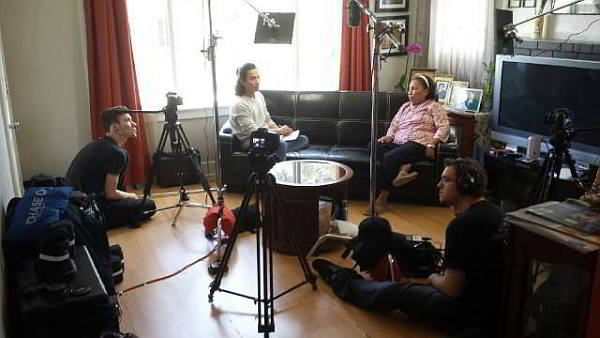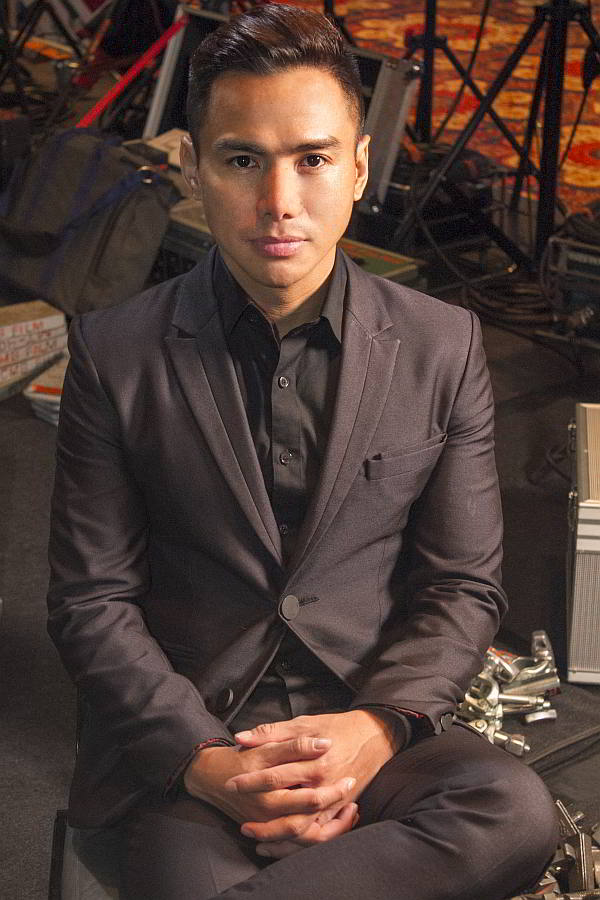The Philippines is the major supplier of labor migrants in Asia, a huge fraction of which are female overseas workers according to a study of the Women and Gender Institute for the United Nations Children’s Fund.
Women, single or married, with or without family, move as part of their effort to find a job, to flee from poverty, to escape a consequence.
For filmmaker Jethro Patalinghug’s mother Virginia, it was a bit of all. Migration is an economic, social, and political issue that directly affects those who moved and those who got left behind. Jethro summed it all in his short documentary film, “My Revolutionary Mother,” which recently won Best Philippine Focus Award at the Cebu International Documentary Film Festival at the Waterfront Cebu City Hotel and Casino last Aug. 17.
In the film, he recalled a nine-year-old Jethro witnessing his mother’s political activism during the People Power in 1986. His mother already worked with Bayan (Bagong Alyansang Makabayan) fighting for oil rollbacks and organizing the city-wide urban poor community long before she was a member of militant women’s movement Gabriela. Her involvement peaked after the People Power, which eventually led her to flee for the United States in 1993, and young Jethro was left with nothing but a gaping hole and a tormenting question, “What was she fighting for that she considered more important than her family?”
The film showed his confrontation with his mother. To him, it was the longest conversation he had with her after almost 20 years of being separated. The emotions conveyed were solid and appropriately intense.
“My Revolutionary Mother” bagged several awards such as Best Documentary in Singkwento International Film Festival, and Audience Award in Boston Asian American Film Festival.
Those years of enduring the sense of abandonment and years of pursuing studies were immensely difficult for Jethro but his ambition made it necessary.
Now a successful 38-year-old, US-based filmmaker, Jethro Cuenca Patalinghug came back to Cebu, where it all started. He sat with the Play! pool in his black slim-cut suit, rocking a pair of shiny sockless leather shoes for a dapper look. He took us behind the scenes of his film and how the relationship with his mother changed for the better. With all smiles, his narration showed no hint of the scars of the past.
When did you realize that filmmaking is your thing?
I was a theater actor in Manila. I was into theater arts in Dulaang UP in UP Diliman. I was starting audition in theater plays and I saw the life of the actors and it was very difficult. So I thought I should venture into something else and find something that is more stable at least financially. So I was a performer then and I had a group and I had a chance then to make a video about the group’s profile so that started everything. I started taking up workshops in film and my first job was at MTV Philippines. I became a TV producer in Manila. I then jumped from one TV network to another from Studio 23 to GMA 7 and then TV 5.
What’s the challenging part in coming up with a documentary?
The most challenging part is it talks about me, and there’s confrontation involved so during the confrontation I was balancing between my personal life and the director’s side of me. So when it became very emotional and we were crying, at the back of my mind I was thinking “This is good. I hope the cameras are catching this.” Somehow I was cheating myself because the director in me wanted to have a sense of control over the entire situation. It’s the worse that I have indulged myself in the process, but having said that, I went into filming this prepared. That’s the hardest part—balancing the director part in me and the son who just wants to find some answers.
What do you think was the best part?
After the film, the relationship with my mother became better. The film gave us an opportunity to cap it off… whatever happened in the past… because we never really talked about it. We bonded more after the film, parang it broke the ice in all of us.
What is your signature trademark as a documentary director or filmmaker?
My emotional narratives, but I guess every filmmaker can claim that. Officially, this is my first film, and I still need to have a body of work… but I do have a knack for storytelling. So there has to be a change in the journey of my characters. I mean, you can see it in the change of my Mom as well as in me in this documentary.
In that climactic scene, was your Mom looking at you? Because it seems that she was looking on the other side …
She was looking on the side, she was trying to avoid it. But mahaba ‘yung scene na ‘yun at ki-nut ko na lang pero mahaba ‘yung kanyang rebuttal. I have to ask her so many times why, why, why, and all the while she was just trying to dodge it.
Did it get to you emotionally? Did you take a step back and fight back a tear because that moment was really heavy?
No, it was continuous. Then again, when I started crying the director in me was like… this is so good. Is the camera taking this? But let me just say that when I started making the film I had already forgiven my Mom. I went there and have somehow accepted na the situation. I have seen the potential of our story and I decided to go with the confrontation. We haven’t gone through that, and in fact, I consulted a psychologist before the confrontation and asked whether it is right for me to confront my Mom. That somehow helped me get focus into what I would really want to happen and what my goal is by confronting her. I found out na I just want to raise the level of our relationship. Because I have been separated from them for 18 years, we have this gap, and all I really want was to have that relationship with my Mom.

Jethro and his mom Virginia during the filming of “My Revolutionary Mother”
Aside from consulting a psychologist, what other personal preparations did you go through?
I was also the producer of the film and there’s this scene in the post office and it’s really hard to get inside the post office since there is a security issue, so I had to talk to the supervisor of Mom because cameras are not usually allowed in the post office. So I was able to bring in my whole equipment—camera and crane inside the post office. As a whole, producing the whole film does take much out of you. This is a film that’s shot in two countries, and then I also had to research and acquire from ABC 5 footage of the Edsa revolution, and then more days of research at the San Carlos archives, flipping through newspapers from1986 to 1992 as there are no microfiche or film slides. Daghan gyud kaayo… na flip gyud nako tanang newspaper for three days, sakit gyud kaayo akong likod.
If it weren’t for the film, would you still do the research for personal reasons?
My film was the excuse for me to confront my Mom. I wouldn’t have talked to anyone or to my siblings about it. My camera was my excuse to get into that emotional space because I know na there’s kind of like a pretend nga this is a movie lang, but in truth, this is something personal for me.
But I do know na eventually she will answer me, so that’s why I came prepared with the pictures framed. Because she always wanted a picture of us together … she never had a family picture for 25 years… at last, when I went there one Christmas, I took a picture of us together. And I thought that I don’t want the confrontation to spiral altogether so malipay na siya if I gave the picture to her—dili na siya maglagot.
What can we expect from you after this?
I have two upcoming films, also documentary films. One is about an oldest LGBT organization in America—the film is titled “Fifty Years of Fabulous.” The other one is “My Name Is Protest” and it’s a protest against Facebook policy on authentic name or real name. Facebook has this policy wherein if you’re using a fake name someone can report you and take down your account. The problem with that is in San Francisco and other parts of the world, there’s a lot of drag queens who have been using other names and they are being attacked and reported by haters or conservatives, and their accounts have been taken down, in effect, they can no longer connect with their families, communities or work even. This does not only affect drag queens, but even other communities like native Americans; domestic abuse survivors, who have been hiding from their abusers; artists… daghan kaayong affected.

Jethro Patalinghug (CDN PHOTO/ Edd Buenaviaje)
Which film inspired you to become a filmmaker?
“City of God.” It’s a film based in Brazil about kids who they became gangsters.
It translated with me because I also grew up in the same environment, in a squatters area, the breeding ground for criminals. It’s basically profiling the slum situation in Brazil where the kids started out as young criminals. It becomes a vicious cycle since the older criminal are being killed by the young ones, and it cycles from generation to generation— you are stucked. I saw this back in 2001, in Cine Manila.
Who’s a local filmmaker that you want to work with?
Lav Diaz. Pero that’s like suntok sa buwan.
Do you have a dream project?
I want to direct Charlize Theron, because of her movie “Monster.” I was just amazed by her—it was an era wherein actors actually change their bodies for the characters they play. She gained weight for the movie, and it was just total transformation. She won an Oscar for that.
Like you, there are still kids out there in the slums who are also aspiring to become somebody in the future. What message do you want to send out to these kids?
There was a point when I was living in barrio Luz that I had an epiphany. I realized that I felt very stagnant, in the community and in the country . I thought that I needed more education. I needed to empower myself. I realized that I had to get out and really pursue my dreams. So my message is… do not settle for what you have right now. If you think you are not improving, or the status quo is not working to your advantage… go out there. It’s a cliche to say that there’s no limit to what awaits you… but look, it happened to me!


